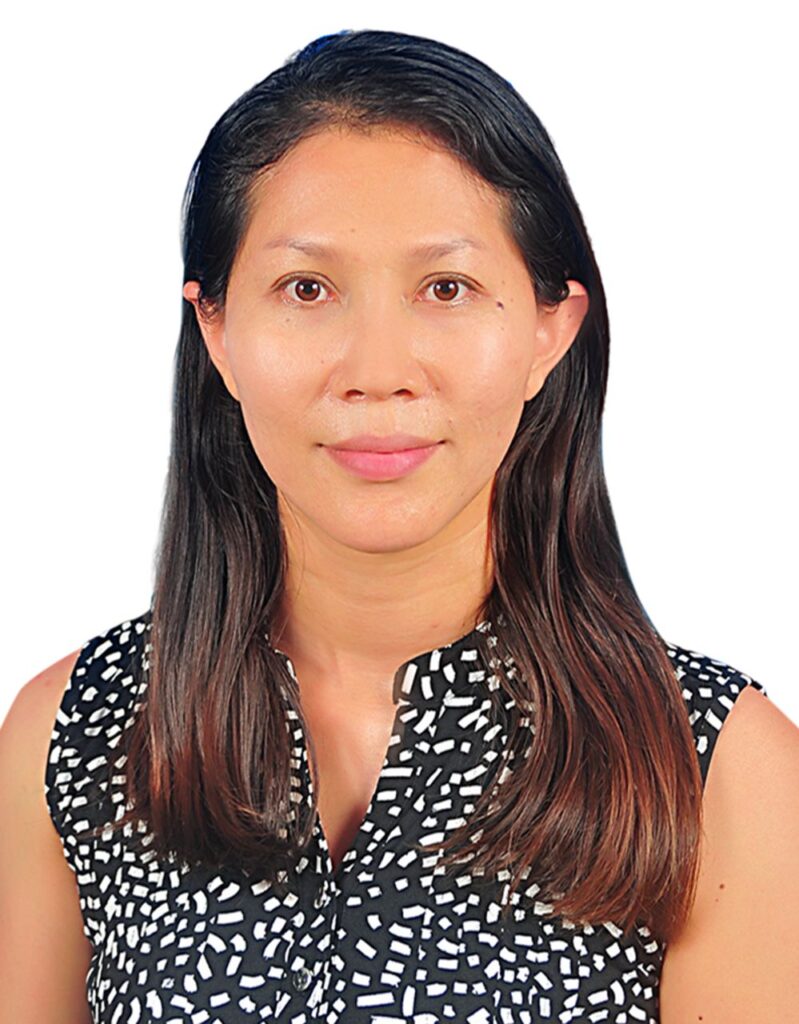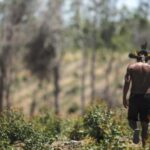
Name: Lina Hong
Title: Operational Manager
Organization: Grandis Timber
Role: Lina is the overall responsible for Operations in Grandis Timber’s teak plantations (among other species and land uses). She leads the management team and executes the sustainability mandate for the company.
Education: Master of Science in Biodiversity Conservation, Royal University of Phnom Penh
Years in the field: 8
Women in Forest Operations
Forest operations encompass several moving parts. Simplifying the forest management lifecycle, we start with planning, nursery management, through site preparation, tree planting, stand management (weeding, thinning, pruning), fire management, harvesting, grading and transport for the wood to move on to be processed. The land is then rehabilitated, and the process starts again. Forest operations are limited to remote settings in all-weather conditions and the labor is often physically demanding. Consequently, these characteristics have given way to a male-dominated field.
I started my forestry career in forest operations on the planning side. I would stay in a logging camp to access forest that was disconnected from other logistics routes. I would join my colleagues in the cookhouse for breakfast before we would drive out to “the bush”. We would then put on our hard hats, caulked boots, and heavy field gear, grab our water-proof maps and head into the forest (often shared by bears and cougars) to start designing an area for harvest. Climbing often steep, rocky terrain, often alone – only connected to my fellow co-workers by a 2-way radio. Not surprisingly I was the only woman. Literally being a woman in the woods requires a lot of perseverance and proving yourself capable.
In my discussion today, I speak to a woman who has done just that. In six years, Lina Hong has moved from a Sustainability Officer at Grandis Timber, a forest company in Cambodia, to become the Operational Manager. My takeaway from my conversation with Lina comes in her closing remarks:
“I think that as women, we have physical barriers to do some things, but these are just physical – it is not about our brains. As women we need to be confident in our abilities, and not think less of ourselves and our abilities because we are women.”
I hope you enjoy this article, where Lina has learned this lesson herself and is now a confident leader.
Quick to Rise
I know Lina from having worked with her previously, and right from the beginning I was impressed by her diligence and professionalism. When we first worked together, she was responsible for FSC certification and CSR. She was new to the field, but quick to learn and apply her strategic thinking. Knowing that she had risen fast in Grandis, I asked Lina how her career has evolved from university to where it is today.
Lina: My background is not in forestry, but in Environmental science. While in my studies, in 2012, I was nominated by the department head of the Biodiversity Conservation Faculty at my university to join a 2-week specialized program on CSR. My essay resulting from this work was selected and I was invited to Japan to visit different corporations implementing CSR. This experience made me very interested in the application of CSR in the environmental context. In 2014, after I had graduated, Grandis Timber posted a position for implementing CSR and managing FSC certification in its forest operations, where I applied and was offered the position. Working with Grandis was my first job after graduating from university. Over six years, I moved from Sustainability Officer, through to Senior Sustainability Officer, Sustainability Team Manager, and finally Operational Manager, where I have now been working for the past two years.
I asked her how she moved so quickly into the top management position within the company.
Lina: In 2020, the CEO of Grandis Timber was leaving the company, and I was one of three senior staff recommended to the Board of Directors to take over the position. The other two candidates I later learned, were male colleagues who had several more years of experience than me in forest operations. I was offered the position; I believe because of my well-rounded experience in the company. I was responsible for maintaining the FSC certification, which for us, is a backbone of how we run our business. I had become familiar with the operational side of the business from actively asking my colleagues to demonstrate how the plantations are managed. I also had a lot of involvement in community engagement, conservation management and government relations.
After they offered me the position, it took me one month to consider the offer. I was reluctant to accept the role because I felt I didn’t have enough experience or seniority compared to others, and the most significant concern I had was that I didn’t know if I had the ability to take on this level of responsibility – I was unconfident. In the end, I decided to take the position, after encouragement from the exiting CEO and the offer of coaching when I needed it. After two years in the position, I am much more confident in my abilities.
Souring a well-deserved promotion with a lack of respect
Throughout our conversation, there were various references to lack of respect from her colleagues when she was promoted to this role. She explained that through a combination of being female, and having a lower level of seniority and experience, she has encountered a lack of respect in her authority. I asked Lina to explain what she meant by this.
Lina: From when I was fully onboarded for the Operational Manager position, I have experienced a gender barrier in my leadership role. I feel that I am not fully respected, and sometimes I feel like my capabilities to fulfil the role are underestimated. This did not come from the Board, or our ex-CEO, who have always been very supportive, but from other senior staff. There are different examples, but one is that I have observed the difference in the way they communicate with me and how they communicated with the previous CEO. I don’t think most of the senior staff expected me to be promoted to this position. After all, when I entered the company at an officer level, these colleagues were already in management. I understand how they would have felt. In my role as a manager of these and other colleagues, I take a consultative approach, where I seek their input on relevant issues rather than directing. I respect my colleagues and their experience and am humbled to work with them.
Cambodia still strongly believes that a woman’s place is in the kitchen
I was curious to understand more about the cultural norms surrounding gender in Cambodia. So asked Lina to shed some light on gender diversity in her country and how it is reflected in the very company she manages.
Lina: An article I read on gender equality in Cambodia explained that though there has been progress over the last two decades, women continue to be under-represented in politics and in public decision making; and at a very basic level with access to education and representation in formal employment. According to a major UN survey, 62.6% of Cambodian males and 57% of Cambodian females believe that men should have the final say in all family matters. The study also showed that 82.4% of men and 92.7% of women believe that a woman’s most important role is to take care of her home and care for her family – that’s it. Even our traditional Khmer viewpoint on education is that women should not study much, because they still need to be busy in the kitchen.
By looking at gender diversity in Grandis, this statistic is evident – in management positions, only 5% of us are female and staff-wide, only 10% are women. It is the same when looking at labor work, where there are much fewer female day workers than men according to the company’s annual 2021 HR Report.
There are some practical elements here to consider – In Grandis, we see that different genders are better suited for different roles. For example, at the nursery, we prefer females over males because they tend to be more careful. Out in the field, with activities such as pruning or thinning, we prefer to have male workers who are physically stronger. Unfortunately, other gender barriers exist. Even for myself, the Operational Manger, I am not able to drive around the plantation alone, because it is not safe. It’s not because I can’t drive, but because I might be exposed to certain violence that men don’t have to worry about.
Support is key to managing a career and motherhood
Given the insight into Cambodian gender disparity, I asked Lina if she has any children, and if so – how being a mother has impacted her career.
Lina: I have a five-and-a-half-year-old daughter and balancing my career and being a mother has absolutely had its challenges. I would not have been able to get to where I am in the company without the support of my family and my husband. For me, the biggest challenge early in maternity was that I was not allowed to go to the plantation throughout my entire pregnancy and not for a year after, when I really wanted to. It was also hard to manage the work – because I had to work an eight-hour day, and then come home and take care of my baby. My maternity leave was three months. My mother helped a lot, and my husband gave up his job so that I could focus on my career. When my daughter was 7 months old, she went to daycare so my husband could find a job and we wouldn’t have to overburden my mother.
Aspirations for the future
Given that Lina is still relatively early in her career, I asked what her aspirations are – if she was to fast forward 20-30 years into the future when she is about ready to retire – where would she be, and what more would she have accomplished.
Lina: I want to get involved in the government, specifically the Ministry of Education, maybe even become the Minister of Education. I am considering to explore opportunities in another country in the same field. I don’t want to stay in the same position and same level, I want to challenge myself.
I am very grateful to Lina for taking the time out of her busy day to speak with me (as she currently manages not only her Operational Manager responsibilities, but also the sustainability and community management aspects of the business and government relations). I think there are several nuggets of wisdom in Lina’s experience that she can lend to young women rising to the top in the forestry profession – Accept support, trust in your capabilities, and do the work. If you would like to get in contact with Lina, you can find her here.





